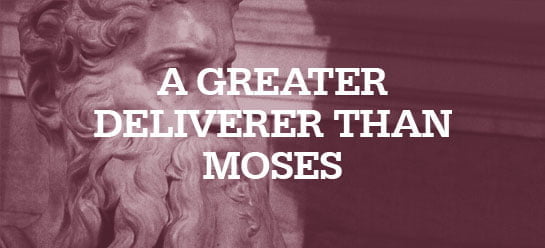⏱️ Estimated Reading Time: 6 min read
This article is part 5 in a series titled Jesus, the Truer and Greater Moses, in which we look at how the life and ministry of Moses is but a shadow of Jesus Christ. You can read part 1, part 2, part 3, and part 4.
Exodus 1. Here’s the scene: Israel’s prominence was increasing throughout Egypt, and it was increasing fast. It was a fruitful joyous time for the Hebrews. With the growth of their families, it appeared that the Lord was fulfilling His promise to their father Abraham. However, there was a new king in town, and he wasn’t a big fan of Israel or their God. Pharaoh and his Egyptians felt threatened by this rising demographic. And how did they respond? By overpowering and enslaving the nation of Israel. Verses 13 and 14 describe the dreaded event:
They ruthlessly made the people of Israel work as slaves and made their lives bitter with hard service, in mortar and brick, and in all kinds of work in the field. In all their work they ruthlessly made them work as slaves. (Exodus 1:13-14)
Israel was forced into slavery for 400 years. And during this era of seemingly perpetual bondage, the nation of Israel cried out for rescue and redemption. They “groaned and cried for help” (Exodus 2:23). Where was their God? Had He abandoned them? Had He given up on His covenant promise? Indeed, the Lord their God was listening. He heard their cries and raised up a prophet who would deliver them.
Moses, the Great Deliverer
Enter Moses. In Exodus 3, the Lord speaks to Moses through a fiery bush, commissioning Moses to deliver His people.
Then the LORD said, “I have surely seen the affliction of my people who are in Egypt and have heard their cry because of their taskmasters. I know their sufferings, and I have come down to deliver them out of the hand of the Egyptians and to bring them up out of that land to a good and broad land…Come, I will send you to Pharaoh that you may bring my people, the children of Israel, out of Egypt.” (Exodus 3:7-10)
There, on the mountain of Horeb, through the bush of fire, God made it clear that He would use His servant Moses in huge ways. He gave Moses His very name(“Yahweh”), and He commissioned the prophet to lead Israel out of its four hundred year captivity. It’s no wonder that Moses was considered the ancient hero of Israel. He would become the peoples’ deliverer.
Why Peter Got It Wrong
Centuries later, God would send another deliverer—a truer and greater deliverer who would deliver not only the Hebrews but the Gentiles too.
In Matthew 16, Jesus had an important dialogue with his disciples about this forthcoming deliverance.
Now when Jesus came into the district of Caesarea Philippi, he asked his disciples, “Who do people say that the Son of Man is?”
And they said, “Some say John the Baptist, others say Elijah, and others Jeremiah or one of the prophets.”
He said to them, “But who do you say that I am?”
Simon Peter replied, “You are the Christ, the Son of the living God.” (Matthew 16:13-16)
So far in this passage, we think, “Yes! Peter got it right!” But although Peter said the right words, he still missed the whole point. He did not get the fullness of who Jesus truly was or what it meant to be the Christ. Peter’s understanding was that Jesus would lead Israel out of physical captivity. The Romans were oppressive, and Jesus would be the one to deliver them from political oppression (or so Peter thought). The cross was not on Peter’s radar. He thought that the exodus Jesus would lead his people through was a deliverance from Roman tyranny.
As their dialogue continued, Jesus reveals something much different, and far greater:
From that time Jesus began to show his disciples that he must go to Jerusalem and suffer many things from the elders and chief priests and scribes, and be killed, and on the third day be raised.
And Peter took him aside and began to rebuke him, saying, “Far be it from you, Lord! This shall never happen to you.”
But he turned and said to Peter, “Get behind me, Satan! You are a hindrance to me. For you are not setting your mind on the things of God, but on the things of man.” (Matthew 16:21-23)
Jesus, the Greater Deliverer
Peter was right to understand Jesus—the Christ—to be the prophet and deliverer “like unto Moses.” But he assumed this meant Jesus would lead a physical exodus, just like Moses.
But did Jesus come to lead an exodus?
In a sense, yes! He absolutely came to lead His people on an exodus. But the exodus Jesus led was not a physical one. It was a spiritual one that far surpasses an escape from the bondage of Egypt or the oppression of Rome. His was a greater deliverance—a deliverance from death to life (Ephesians 2).
Jesus came to deliver from sin and death.
Moses’ deliverance did not require a cross. It was merely a temporal deliverance, not an eternal one. Jesus, on the other hand, would deliver His people from eternal death to eternal life. This required Him to take up a cross.
Moses’ exodus was possible because God’s wrath came down upon Pharaoh’s son. Jesus’ exodus is possible because God’s wrath came down upon His only begotten son—the Lord Jesus Christ who takes away the sins of the world. Jesus is the truer and greater Moses who leads His people in the greatest exodus of redemptive history—deliverance from the prison of sin and death.
Until Jesus corrected them, the apostles had it all wrong. Jesus didn’t come to be a great like Moses. He came to be greater than Moses.
Next post: Moses the Beloved Servant, Jesus the Beloved Son




